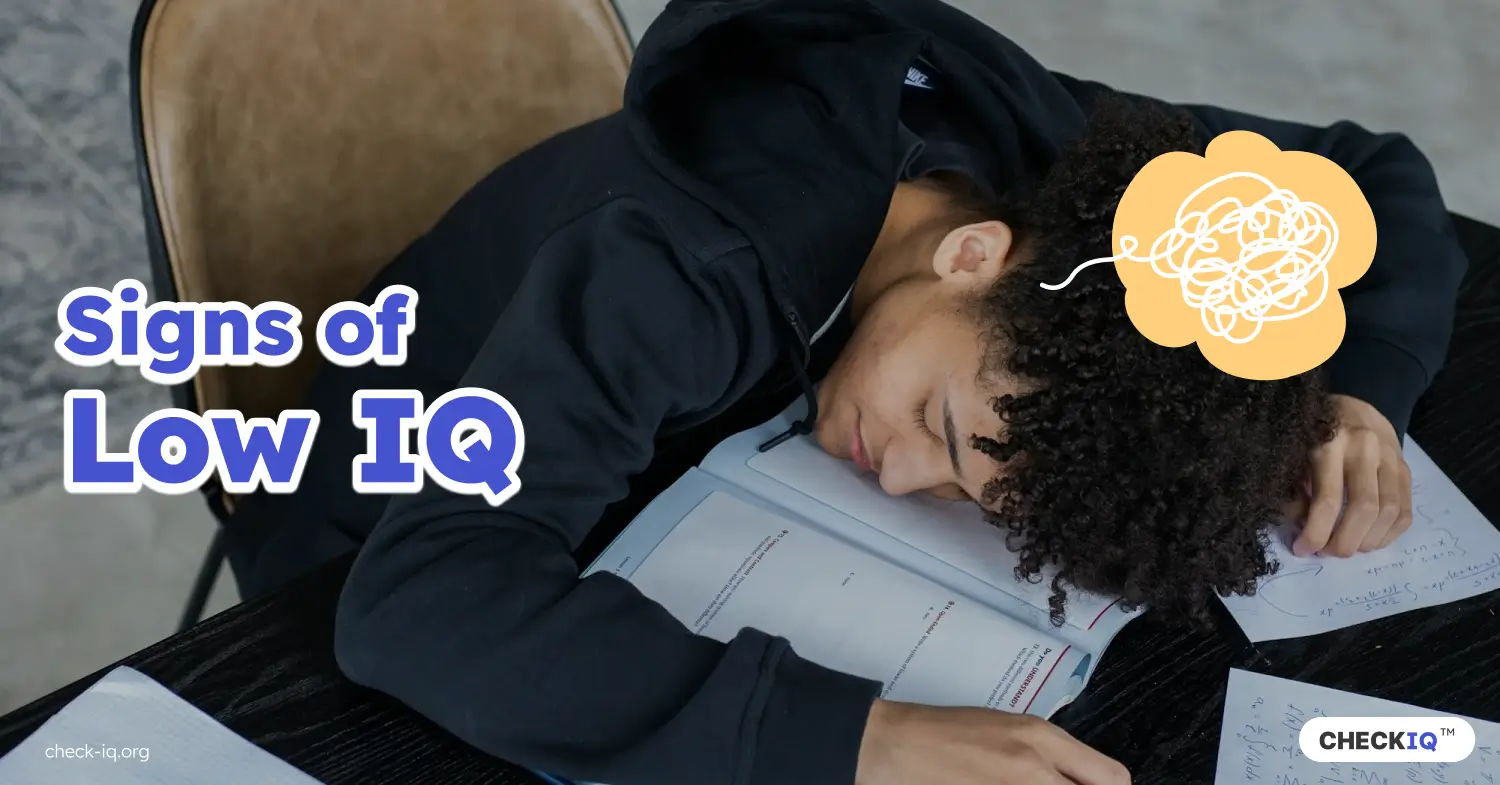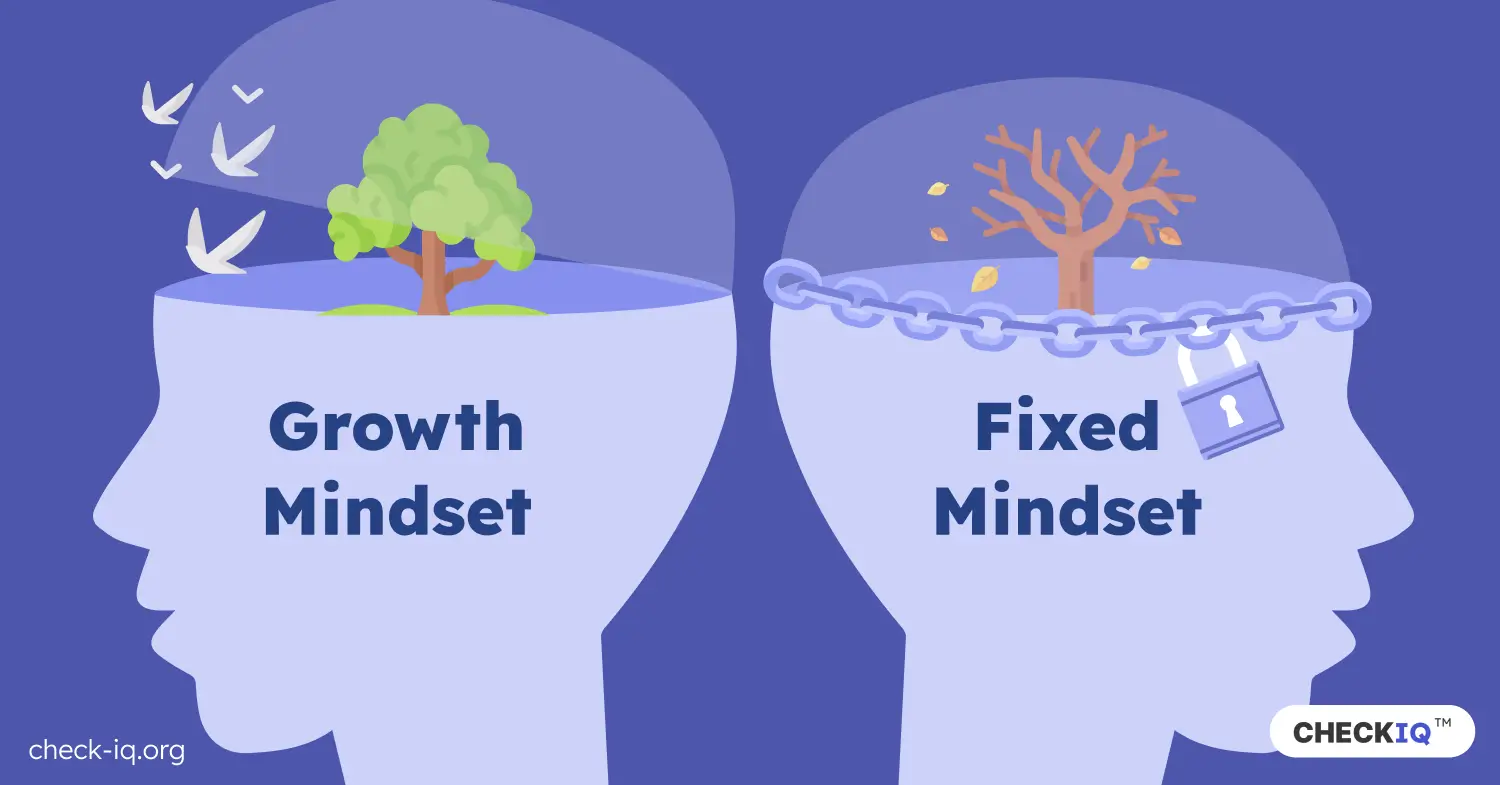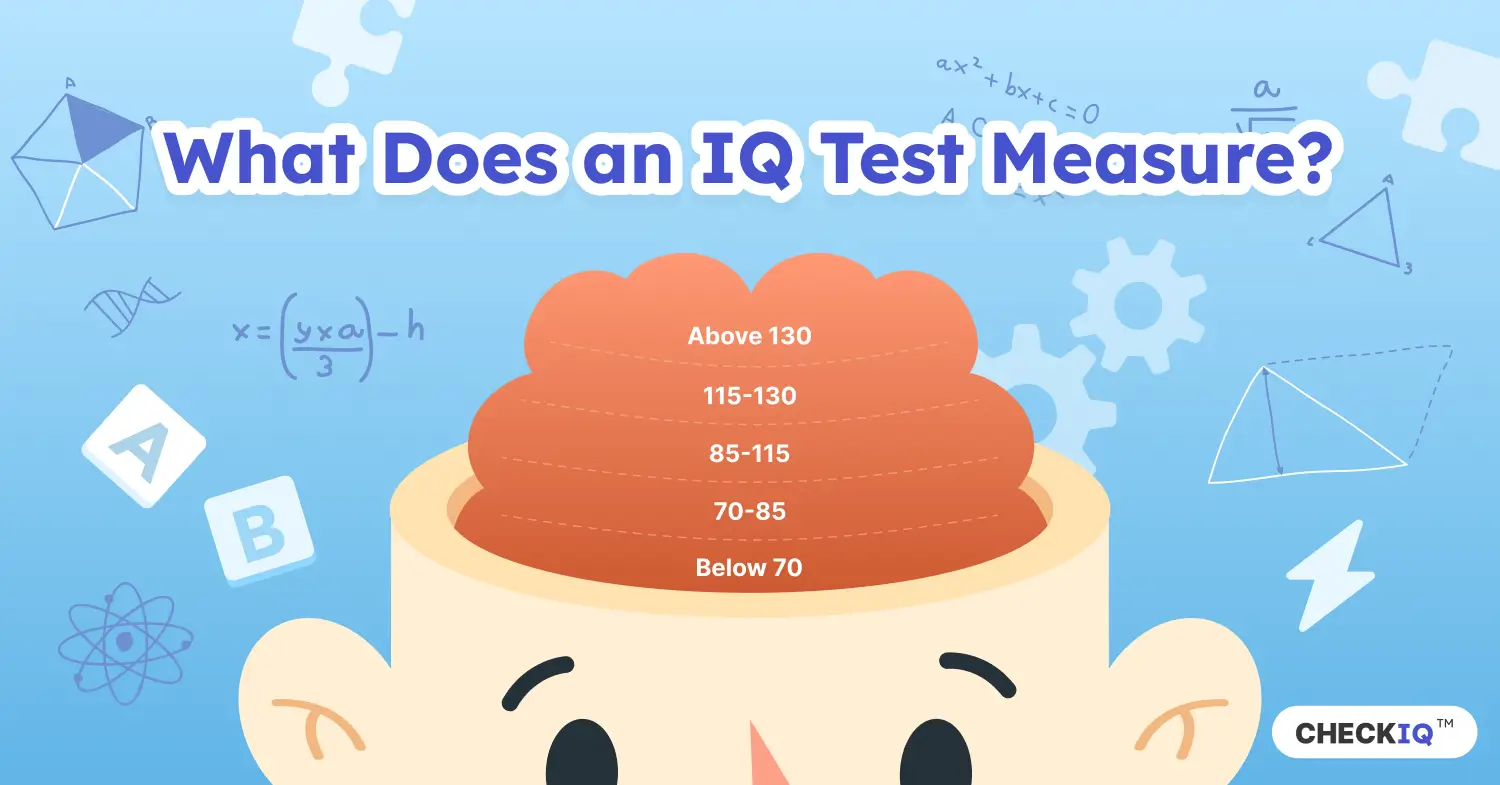Intelligence is a sum of many diverse traits.
When we talk about IQ, or Intelligence Quotient, we refer to a score you get from tests that check how well-developed your cognitive abilities are compared to those of others your age. However, this score only indicates a part of your potential.
So, what exactly does this score mean, and how do we decide if someone is truly smart or not?
Let's explore all the things that influence IQ together:
1. The Typical Signs of Low Intelligence
Think of intelligence as a spectrum where IQ scores help us find our place. A 'low IQ' typically falls below 70, while 'high intelligence' often refers to scores around 130 or higher.
While IQ is a number that doesn’t include all aspects of intelligence, some behaviors can suggest the existence of cognitive challenges. These signs should be looked at in a well-defined context, though, as they can be influenced by many things, such as stress or lack of education.
Here are some typical signs of low intelligence, as commonly assessed by IQ:
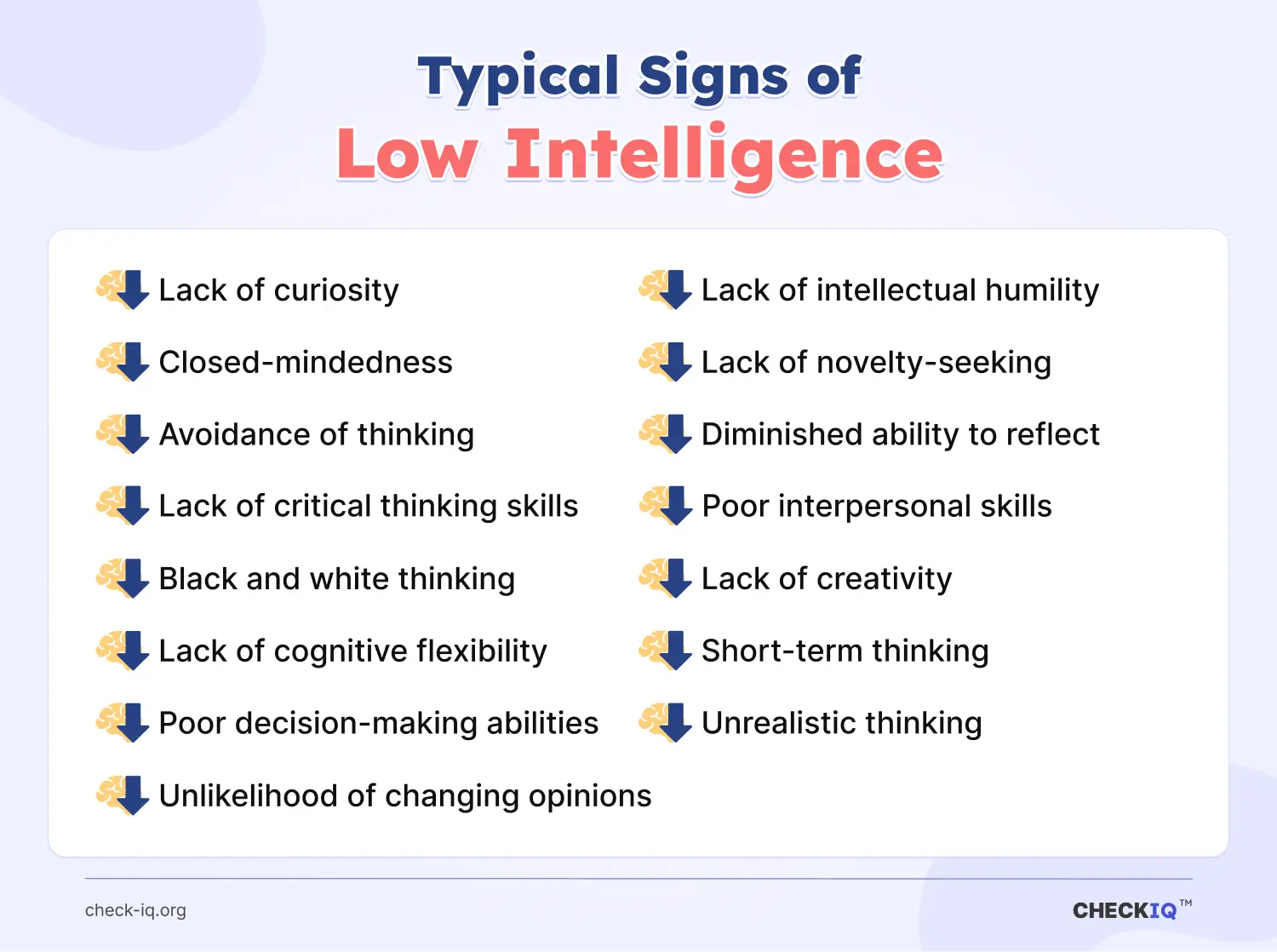
- Lack of curiosity
Imagine someone who never asks questions or explores new ideas. A notable lack of curiosity can suggest struggles with cognitive processing. For example, a person might never show interest in trying new foods, exploring new hobbies, or learning about different cultures. - Lack of intellectual humility
People who think they know everything and refuse to admit their knowledge gaps might exhibit low intellectual humility. This could look like someone who always insists they’re right during a group discussion, even when they lack expertise on the topic. - Closed-mindedness
Let’s consider the case of someone who always refuses to consider new ideas or viewpoints. Closed-mindedness, such as rejecting new ways to solve a problem at work or insisting on outdated methods, can signal difficulty with complex thinking. It can be interpreted as a typical sign of low intelligence. - Lack of novelty-seeking
An inclination to stick with the familiar and remain in your comfort zone even when you’re being offered an alternative can suggest limited cognitive flexibility. For example, someone might always go to the same vacation spot, eat the same meals, and resist visiting new places or trying new activities. - Avoidance of thinking
If thinking feels like a chore and someone avoids deep reflection, it might indicate cognitive difficulties. They might prefer watching TV for hours over engaging in thoughtful discussions or planning future goals. - Diminished ability to reflect
Reflection involves analyzing past experiences to learn from them. A person who struggles with this might repeat mistakes, like continuously mismanaging their finances without learning better budgeting strategies or making the same errors at work without improvement. - Lack of critical thinking skills
Critical thinking means analyzing facts to form an opinion. Someone who takes information at face value without questioning it might display signs of low intelligence, such as believing every headline without verifying the source or falling for obvious scams. - Unlikelihood of changing opinions
An unwillingness to adapt one’s views when presented with new evidence can indicate cognitive rigidity. For example, someone might stick to outdated beliefs about health despite new scientific research or refuse to change their opinion even when proven wrong. - Black and white thinking
Seeing the world in strict, either-or terms without recognizing nuances can hint at simplistic cognitive processing. For instance, someone might view every situation as completely good or bad without considering the grey areas, such as thinking a person is entirely good or entirely evil based on a single action. - Lack of creativity
Creativity can show in many forms, from problem-solving to artistic expression. A general absence of creativity might point to difficulty in thinking outside the box, such as struggling to come up with new ideas for a project or finding new solutions to everyday problems. This is often considered a sign of low intelligence quotient. - Lack of cognitive flexibility
Adapting to new, unexpected situations requires cognitive flexibility. A person who can’t switch gears easily might struggle in dynamic environments, like finding it hard to adjust when plans change suddenly or when facing new challenges at work. - Short-term thinking
Focusing only on immediate gratification without considering future consequences reflects an inability to plan ahead. For example, spending all money immediately without saving for bills or emergencies or making impulsive decisions that lead to long-term problems. - Poor decision-making abilities
Making poor decisions repeatedly, especially in situations they’ve been in before, may indicate low intelligence. This could be someone who consistently makes unhealthy lifestyle choices despite knowing the risks, like eating junk food despite health warnings or repeatedly getting into financial trouble. - Unrealistic thinking
Holding onto unrealistic beliefs or goals despite contrary evidence can denote a struggle to process information accurately. For example, planning a lavish vacation without any financial means to support it or believing in highly improbable outcomes without evidence. - Poor interpersonal skills
Effective interaction involves understanding and responding to social cues. Someone with poor interpersonal skills might frequently misinterpret others' emotions, struggle with basic social interactions, or have difficulty maintaining relationships.
Recognizing signs of low intelligence helps us understand potential cognitive hurdles. It's about awareness and improvement, not labeling. Everyone's journey is unique, and a low IQ does not define a person's entire potential or worth.
A reliable 100% adaptive online IQ Test. Get your IQ score immediately.
Start My IQ Test
2. How a Low IQ Affects Daily Life
Just like having a high IQ can have its own challenges, having a low IQ can also impact daily experiences in unique ways. From tackling everyday tasks to navigating social dynamics, a person's Intelligence Quotient can play a significant role.
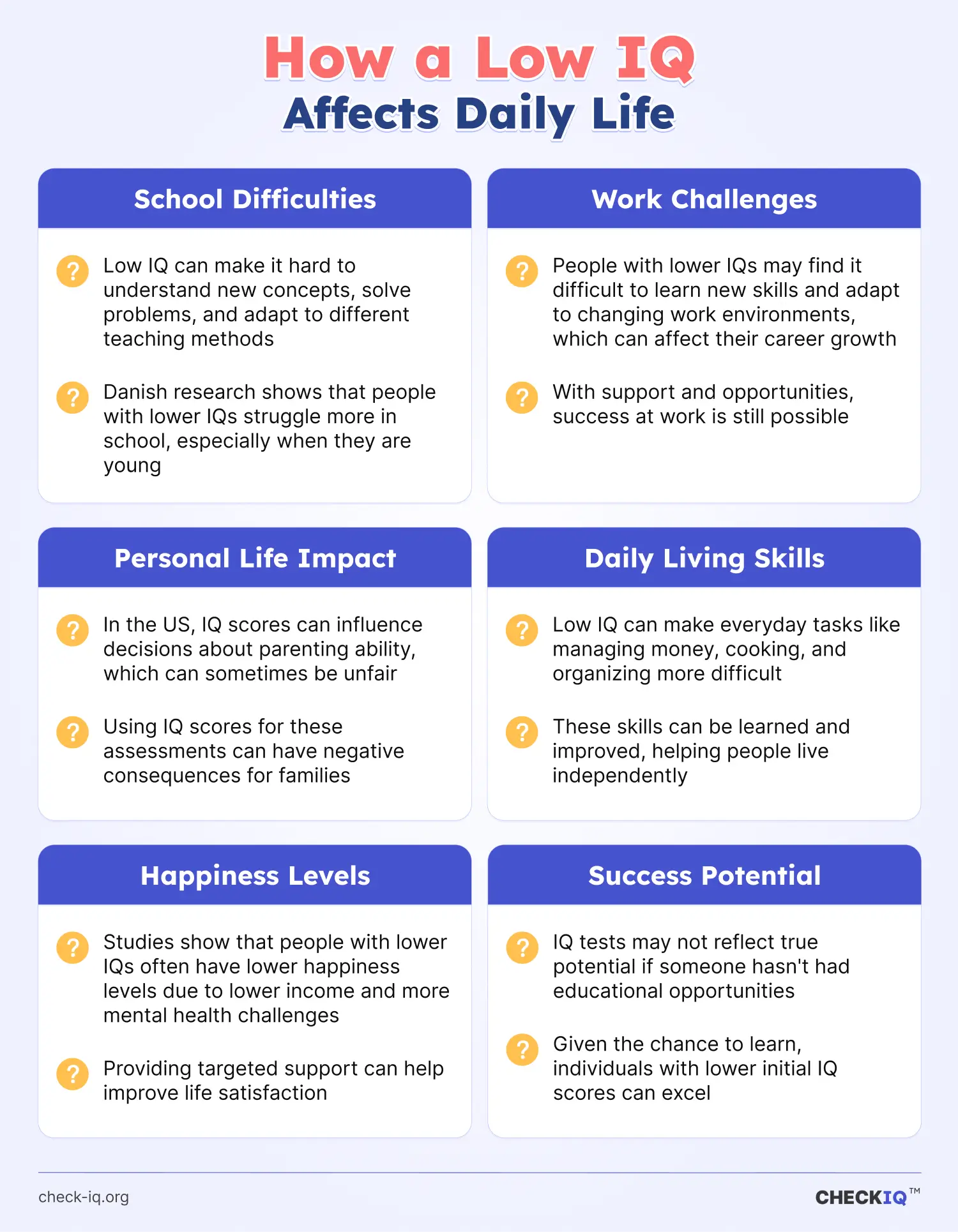
School difficulties
When it comes to education, having a low IQ can present several challenges. Academic settings often require the ability to learn new concepts quickly, solve problems efficiently, and adapt to various teaching methods.
According to a study tracking Danish men, those with lower IQ scores faced more difficulties in educational achievements, particularly in their younger years.
These challenges can impact their ability to keep up with the curriculum and excel in a competitive academic environment.
Workplace difficulties
In the workplace, similar issues arise. Employers often look for individuals with the mental agility to learn new skills quickly, solve problems on the spot, and adapt to changing technologies and industries.
If your IQ is below average, you might find it harder to meet these demands, which can hinder professional growth and achievement.
However, this doesn't mean you can't succeed at work if you have a low IQ, as we’re going to see further.
Impact on personal lives
The use of IQ scores isn't limited to education and employment; they can also significantly impact personal lives.
For instance, in the US, IQ scores are often a key factor in assessing parenting ability, which has led to controversial decisions and significant consequences for families.
Critics argue that relying heavily on these assessments is misguided and unfair, as highlighted in a Guardian article, where such measures can result in devastating outcomes for parents with lower IQ scores.
Managing adversity
The ability to live independently hinges on a variety of adaptive skills, such as managing finances, cooking, or organizing your day. If you struggle with a low IQ, handling such everyday tasks might be harder for you compared to someone with an average or high IQ.
Why does this matter? Because life throws curveballs, and the ability to adjust and cope with new problems and changes is key to not just surviving but thriving.
The good news is, unlike IQ, adaptive skills can often be taught and honed over time, enabling individuals to lead fulfilling, autonomous lives regardless of their IQ level.
Happiness level
A study from the University College London published by the Cambridge University Press has suggested that people with lower intelligence are often less happy. This is attributed to factors including lower income and mental health challenges that tend to be more prevalent in individuals with low IQ.
The interplay between these factors further emphasizes the need for targeted support, particularly in early development stages, to improve not just intelligence but overall life satisfaction.
However, this can go both ways: since IQ tests are not personalized to the cognitive abilities or special needs of such categories, the issue might be lack of intersectionality, and not lack of intelligence.
For instance, a person that did not have the opportunity to attend school may score lower at any IQ test than someone who completed postgraduate education. However, if given the chance to study, this person could outperform their peers with ease.
Can you have low IQ and still be successful?
The answer is a resounding yes. Success isn't solely defined by Intelligence Quotient scores but by what you do to improve your skills and evolve healthily. You don’t necessarily need a high IQ to become rich.
We often display intelligence in ways that are not captured by standard IQ tests, because there are countless traits they don’t measure, such as understanding emotions. History is full of stories about people who, despite not conforming to the high IQ archetype, have led impactful and accomplished lives.
3. Can Your IQ Get Lower Over Time?
Intelligence isn't set in stone; it can change over a lifetime, sometimes for the worse. Various factors, including environment, lifestyle, and external pressures, can cause a decline in IQ. Understanding these influences is crucial for addressing and mitigating cognitive decline.
Impact of environment
As research shows, your environment significantly impacts cognitive function. Growing up in a stimulating environment with access to books, educational toys, and rich social interactions can boost cognitive abilities.
Conversely, a deprived environment can impact cognitive development negatively, leading to a lower IQ. For example, children raised in impoverished conditions often lack the resources needed to develop critical thinking and problem-solving skills, which can lead to lower IQ scores over time.
Parental influence
Parents play a pivotal role in a child's cognitive development and research has shown the impact of early family life on IQ. Engaging children in conversations, reading to them, and encouraging curiosity can significantly enhance cognitive growth.

Understanding the signs of low IQ can help provide a clearer picture of how these various factors manifest in daily life and impact overall cognitive abilities.
Neglect or a lack of stimulation, on the other hand, can result in lower cognitive functioning. While genetics lay the foundation of intelligence, the environment provided by parents shapes the final cognitive outcome.
Impact of poverty
Poverty introduces unique challenges that can lower IQ over time. Research at Princeton University highlights how poverty-related worries consume cognitive resources.
For instance, poverty increases the risk of developing chronic stress exponentially - according to a 2023 study on educational inequality, this illness can severely impact academic performance, as it has a negative effect on neurocognitive development.
Even more, poverty is so damaging that it generates a distinct category of stress, namely “poverty-related stress”. This shows the dire need for educational systems that take into consideration all relevant aspects of a person’s life when providing support.
Health factors
Physical health also plays a critical role in maintaining IQ. Researchers have found that physical activity is positively correlated with high IQ scores.
Chronic illnesses, poor nutrition, and lack of sleep can impair cognitive function. Ensuring a healthy lifestyle with proper nutrition, regular exercise, and adequate sleep is essential for maintaining and potentially improving IQ.
The Flynn Effect and reversal
Historically, the Flynn Effect showed that average IQ scores increased over the past century due to better nutrition, education, and stimulating environments.
However, recent studies suggest this trend may be reversing in some developed countries. Research indicates that changes in lifestyle, education quality, and even technology use might contribute to this decline. This reversal, which is called the Reverse Flynn Effect, highlights the significant impact of environmental factors on cognitive abilities.
Aging and cognitive decline
Aging naturally brings some cognitive decline, but lifestyle choices can influence the extent of this decline. As reported by Harvard Health, engaging in mentally stimulating activities, such as puzzles, reading, and social engagement, can help maintain cognitive health.
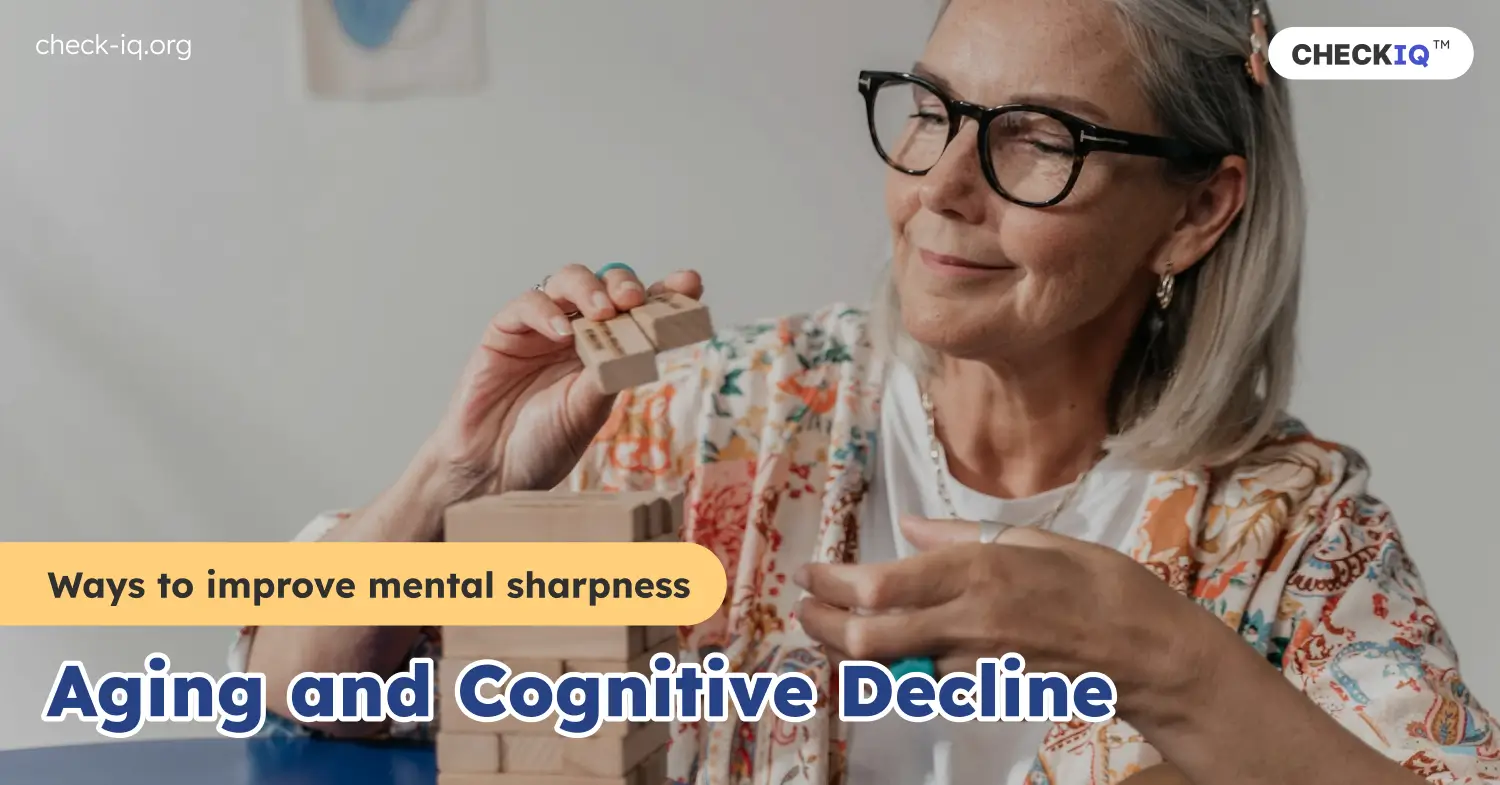
For instance, studies have shown that seniors who stay socially active and continue learning new skills tend to retain higher cognitive functions compared to those who do not. Similarly, reading has been shown to improve IQ by enhancing both fluid intelligence, which helps in solving new problems, and crystallized intelligence, which involves using knowledge gained from past experiences.
4. How We Misjudge Our Intelligence
IQ encompasses various aspects of our abilities, like logical reasoning, spatial understanding, and memory. However, an IQ score doesn't capture the full image of one's intelligence.
Individuals with 'low IQ' might possess extraordinary artistic skills or exceptional hand-eye coordination, or above-average Emotional Intelligence (EQ) scores. In that sense, they are not necessarily low-intelligence people.
Conversely, those with 'high intelligence' levels might excel academically, solving complex equations or drawing insights from dense texts with ease.
A 2022 study by researchers at the University of Graz sheds light on an intriguing phenomenon: people often misjudge their own intelligence. This research shows that, while most believe they are slightly smarter than average, their self-assessments, especially in verbal abilities, may be unreliable. At the same time, those who struggle with verbal tasks tend to overrate their skill level, reflecting a narrow version of the Dunning-Kruger effect, where individuals with low ability overestimate their competence.
This insight is crucial when discussing intelligence levels. Just as one might need external feedback to gauge singing talent accurately, assessing cognitive strengths and weaknesses requires more than introspection. It involves testing, outside observation, and understanding that intelligence is multifaceted and cannot be fully represented by a single number.
Ultimately, whether identified as having 'low IQ' or 'high intelligence,' your Intelligence Quotient is just one part of the picture. Intelligence is diverse, and its expression varies widely among individuals. Recognizing your place on the IQ scale can provide valuable information, but your true intelligence is not limited by it.
5. FAQ About the Signs of Low IQ
Let’s address some common questions to help clarify misconceptions.
Does having ADHD mean you have low IQ?
No. ADHD, or Attention Deficit Hyperactivity Disorder, affects attention, impulse control, and may cause hyperactivity. While it can impact learning and performance on standard IQ tests, it doesn't directly correlate with low intelligence.
On the contrary, many with ADHD exhibit remarkable creativity and problem-solving abilities. A study observed that young adults with borderline IQs had higher rates of ADHD, but this does not suggest that ADHD equates to low IQ.
Rather, it highlights the challenges that come with ADHD, which may influence test performance and everyday functioning, not necessarily the IQ itself.
How can you tell if someone is smart or just average?
There is no universal definition of “smart”. If you're referring to traditional indicators of intelligence, such as academic performance or logical reasoning skills, then standardized intelligence quotient tests offer some measure.
However, gauging intelligence is complex, encompassing emotional intelligence, creativity, practical problem-solving, and more. A person's ability to engage in insightful conversations, ask meaningful questions, and learn quickly can be telltale signs of high intelligence.
However, it is crucial to understand that each individual exhibits intelligence uniquely, and high scores in IQ tests don't necessarily reflect practical skills or innovative thought.
Is low IQ considered a disability?
Low IQ on its own is not considered a disability. However, when paired with significant limitations in adaptive behaviors – such as communication or self-care – it may be diagnosed as an intellectual disability.
An intellectual disability involves challenges with mental tasks that affect daily living and takes shape in the developmental stages of children. A low IQ can also indicate the risk of later mental health problems, which supports the understanding that early life intelligence levels can be signs of future challenges with psychiatric disorders, as reported by Harvard School of Public Health.
Ensuring proper support during developmental years can aid a person in managing or overcoming potential future disabilities related to low IQ.

